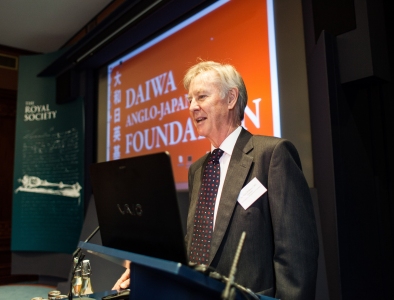
Daiwa Adrian Prizes 2013
The Foundation makes prizes available in recognition of significant scientific collaboration between Japanese and British research teams every three years.
The deadline for Daiwa Adrian Prizes 2013 was 7 June 2013. We had an excellent response to our call for applications, with 43 received from teams across the UK and Japan. The 2013 Daiwa Adrian Prizes were awarded at a ceremony at the Royal Society on 27 November 2013.
Four UK-Japan scientific research teams each received £10,000 in prize money. The four Prizes have been awarded across a wide range of disciplines reflecting the diverse range of scientific cooperation that exists between the UK and Japan. We hope that the awards will also encourage those embarking upon UK– Japan scientific projects to maintain and extend their cooperation to produce similarly fruitful and prestigious collaborations.
We extend our congratulations to the team leaders: Professor Tony James (University of Bath), Professor Seiji Shinkai (Kyushu University), Dr Antony Dodd (University of Bristol), Dr Mitsumasa Hanaoka(Chiba University), Professor Alexander Shluger (University College London), Professor Hideo Hosono(Tokyo Institute of Technology), Professor Takeshi Nakagawa (University of Newcastle) and Professor Hiroyuki Kitagawa (Nagoya University).
The ceremony was attended by Trustees of the Foundation including Sir Peter Williams (our current Chairman), who is also former Vice President of the Royal Society. Guests included Ambassador of Japan, His Excellency Mr Keiichi Hayashi, members of the winning teams and other distinguished scientists. The Prizes were presented by Lady Adrian, whose husband, the late Lord Adrian, a former Trustee of the Foundation, initiated the Prizes in 1992.
Winners of the 2013 £10,000 Daiwa Adrian Prizes
Chemonostics: Using chemical receptors in the development of simple diagnostic devices for age-related diseases.
Institutions: University of Bath, University of Birmingham, Kyushu University, Tokyo Metropolitan University and University of Kitakyushu.
UK Team Leader: Professor Tony James, University of Bath
Japan Team Leader: Professor Seiji Shinkai, Kyushu University
“We hope that the success of our Japan-UK project will encourage others to also embark on such productive, insightful and rewarding collaborations. We see the award of a Daiwa Adrian Prize as the pinnacle of our present collaborative efforts and anticipate the profile and prestige of the award will cement our journey forwards to delivering important healthcare devices that could change the world.” Professor Shinkai
Circadian regulation of photosynthesis: discovering mechanisms that connect the circadian clock with photosynthesis in chloroplasts in order to understand how circadian and environmental signals optimise photosynthesis and plant productivity.
Institutions: University of Bristol, University of Edinburgh, Chiba University and Tokyo Institute of Technology.
UK Team Leader: Dr Anthony Dodd, University of Bristol
Japan Team Leader: Dr Mitsumasa Hanaoka, Chiba University
“It is my great pleasure that we have received the Daiwa-Adrian Prize with my collaborative partner, Dr Antony Dodd. This award will enable us to further develop the relationship between our two research groups in the UK and Japan.” Dr Hanaoka
Exploration of active functionality in abundant oxide materials utilising unique nanostructure: discovering novel properties in traditional materials and addressing the limited availability of technologically important elements through curiosity-driven research.
Institutions: University College London and Tokyo Institute of Technology
UK Team Leader: Professor Alexander Shluger, University College London
Japan Team Leader: Professor Hideo Hosono, Tokyo Institute of Technology
“On behalf of Dr Peter Sushku and myself I would like to thank the Lady Adrian, Sir Peter Williams, Mr Jason James and the Royal Society for this prestigious and generous award acknowledging our long-standing and fruitful collaboration with the colleagues from Tokyo Institute of Technology.
One of the main results of this research and collaboration has been that it facilitated the development and friendship of young researchers in the UK and Japan, which has been recognised by this award. They will carry on this collaboration long after this project. We would like to thank again the Daiwa Foundation for recognizing the potential of this collaboration.” Professor Shluger
Extension of terrestrial radiocarbon age calibration curve using annually laminated sediment core from Lake Suigetsu, Japan – establishing a reliable calibration for radiocarbon dates thus considerably improving the accuracy of the age determination.
Institutions: University of Newcastle, University of Oxford, NERC Radiocarbon Facility, Aberystwyth University, Nagoya University, Chiba University of Commerce, Osaka City University and University of Tokyo
UK Team Leader: Professor Takeshi Nakagawa, University of Newcastle
Japan Team Leader: Professor Hiroyuki Kitagawa, Nagoya University
“I am deeply honored to have been selected as the recipient of the Daiwa Adrian Prize, today you are present at the moment my dream of developing the radiocarbon dating method has come true. I want to express my gratitude to all my colleagues, to friends and to my family, who always support me in all my undertakings. I am very pleased to have received this award. Thank for your choice and for your trust in us.” Professor Kitagawa
“I am naturally feeling very honoured to be here, representing the UK team of the Anglo-Japanese collaboration on “Extension of terrestrial radiocarbon calibration curve using annually laminated sediment core from Lake Suigetsu Japan”. Thank you very much indeed for choosing us as this year’s recipient of the Daiwa Adrian prize.”Professor Nakagawa